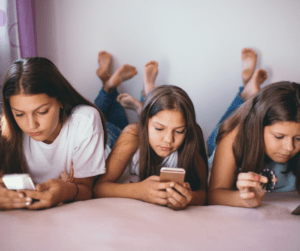The impact of social media on the mental health of children and adolescents is a complex and multifaceted issue. Here are some of the key effects, both positive and negative:
Positive Impacts
Social Connectivity:
Social media can help children and adolescents stay connected with friends and family, especially in times of separation. It provides a platform for developing social skills and maintaining relationships.

Positive Impact of Social Media
Support Networks:
Online communities can offer support for those experiencing similar issues, such as mental health challenges or bullying. Young people may find comfort in connecting with peers who understand their experiences.
Access to Information:
Social media provides access to a wealth of information, including resources on mental health, coping strategies, and educational content. This can empower young people with knowledge and support.
Creative Expression:
Platforms like Instagram, TikTok, and YouTube allow for creative expression through art, music, and performance, which can be beneficial for self-esteem and emotional exploration.
Negative Impacts
Cyberbullying:
One of the most significant risks is the prevalence of cyberbullying, which can lead to anxiety, depression, and even suicidal thoughts. The anonymity of online interactions can exacerbate aggressive behaviors.

Social Media can have a negative impact
Comparison and Self-Esteem Issues:
The curated and often idealized images of peers can lead to negative self-comparisons, contributing to low self-esteem, body image issues, and feelings of inadequacy.
Addiction and Screen Time:
Excessive use of social media can lead to addiction, impacting daily life, academic performance, and physical health. Increased screen time is associated with sleep disturbances and reduced physical activity.
Feelings of Isolation:
Despite being a platform for connectivity, social media can sometimes lead to feelings of loneliness and isolation when individuals feel that their online interactions do not translate into real-life relationships.
Exposure to Inappropriate Content:
Children and adolescents may be exposed to harmful or inappropriate content that can affect their mental health and development, including violent or explicit material.
 Conclusion
Conclusion
Overall, while social media has the potential to provide benefits for children and adolescents, it also presents significant risks that can impact their mental health. It’s important for parents, educators, and mental health professionals to monitor social media use, promote healthy online behaviors, and encourage open discussions about feelings related to social media experiences. Balancing online and offline interactions can create a healthier environment for young people.

